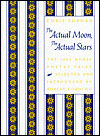book
The Actual Moon, the Actual Stars
by Chris Forhan '82 :: Northeastern University Press :: Reviewed by Ron McFarland

While undertaking a 15-minute workout on the elliptical machine at the fitness center, I read a dozen poems from Chris Forhan's 2003 Morse Prize-winning book, The Actual Moon, the Actual Stars. Some poetry lovers might regard this as a shallow gesture, perhaps even a kind of sacrilege. Of course I intend no such disrespect to the high art of poesy, or as Dylan Thomas so memorably wrote, the "craft or sullen art." The word "sullen" here means "silent," and the North Idaho Athletic Club is no such site. No, I was reading and enjoying such poems as "Piet," "Dumbwaiter to Heaven," and "Some Words for My Ghost" amid a cacophony of groans, wheezes, and grunts. All that from the men; the women manage to work out in an aura of silence and serenity, as if they are not straining muscles, but meditating.
It perplexes me to find a fellow sufferer poring over a fitness magazine while riding the bicycle or treading the stepper. Why not maximize the value of the workout by flexing the mind a bit? So I pumped up my brain on some of Forhan's striking similes: hours that "writhe like worms in a bucket," misery sticking "like rain-soaked clothes," a sky "white and scuffed, like a baseball." It might be too easy to say that whether or not one cares for poems comes down to whether one gets excited by such moments, or by the image of a "Turquoise dragonfly / in the long-stemmed reeds" at dusk, or by the metaphor of boots that "loll their muddy tongues by the door" and "old snow" that "lies bunched like a wedding dress." "You don't make a poem with ideas," Stéphane Mallarmé reminds us, "but with words."
The foregoing is not to say that ideas and themes are lacking in the 45 lyrical poems that comprise Forhan's second award-winning book-length collection. (His first, Forgive Us Our Happiness, was published by Middlebury College Press in 1999 and won the Bakeless Prize.) In his brief introduction, the poet Robert Cording, Barrett Professor of English at Holy Cross College, admires the "world of paradox and contradictory impulses" we encounter in Forhan's poems, and he praises his "jester's wisdom." As may be inferred from the title poem, Forhan's moment is to be found in "that boundless night when dark" draws him from his house and his thoughts "flip and twitch / like fish in a galvanized bucket." The speaker often appears to be alone, and the poems tend to be quiet and meditative, even melancholy (in the Renaissance sense of the term, when it alluded to the intellectual moodiness of poets and scholars), but never morose. Quotidian keeps breaking in with its twitching fish. And in "Confession" we encounter the potentially ominous "dark rehearsal hall" of the poet's skull, bound with his ordinary quest for "a packing retainer ring / and washer for the bathroom faucet." In "My Gospel Is," the first-person speaker that predominates in the book claims to take his orders "from the whiff / of the biscuit factory, the oily smell / of the bicycle repair shop." His "gospel" is
the rolled-up rug discarded in a yard
and rained on, the fusty garden shed,
and the raised glass that stalls halfway
to the lips, the sweet milk gone bad.
Memory and the past figure importantly in such poems as "Grave Robbing by Daylight," "The Past," "Sixteen," "Where the Past Went," and "Failed Love Poem." Forhan refuses to be maudlin on the subject, however: "Farewell, fedoras for the men, farewell, furs for the ladies, / they're flu ng in a trunk, the trunk flung in the room / of what's long gone," including slide rules, rumble seats, and a busted typewriter.
But I do not generally read poems expressly for the intellectual workout. Among the many exceptions, Milton, Rilke, Wallace Stevens, and Brenda Hillman come promptly to mind. I am among that increasing number who read poems for sheer pleasure, and if I bulk up a little between the ears in the process, so be it. Have I just lumped myself in with the world's muscle-heads? I've consorted with worse companions. For me, much of the pleasure comes in the assonantal music of a passage like this, from "Grave Robbing by Daylight":
Still in sleep's big coat, I slip through
the back gate
into the morning drizzle.
My black umbrella
ratchets open like a claw,
a horror movie prop.
A thought has half-awoken me:
the past is in pieces,
scattered, buried, but recoverable—
so are the laws
of its long, exacting operations,
so is the heart
that throbbed within me once.
In the 10 tercets that make up this poem, the speaker recovers scraps of his past, but not really the "simple self" he was before memory—the "blank book the blur of days scrawled its name on"—obscured the boy he was. What draws me back to poems like this, however, are images and figurative language like that in which the umbrella is likened to a claw. And then there are the subtleties of music, the assonance that sustains the subtle rhyming of woven vowels:
back/black/ratchets/half/past/scattered; claw/prop/thought/laws/operations/throbbed.
Usually, I carry a pencil with me so I can take note of such felicitous acts of language, place a checkmark beside the title of this or that poem I know I must read again, like "The Coast of Oklahoma" or the sweetly Keatsian melancholy of Forhan's concluding poem, "Summary and Invocation." And what if you should find yourself reading poems while walking the treadmill, and you lose yourself in the lines and language and find yourself reading that poem over again? Well, there are worse things to do with your time, and with your mind.
— Ron McFarland, Professor of English, University of Idaho